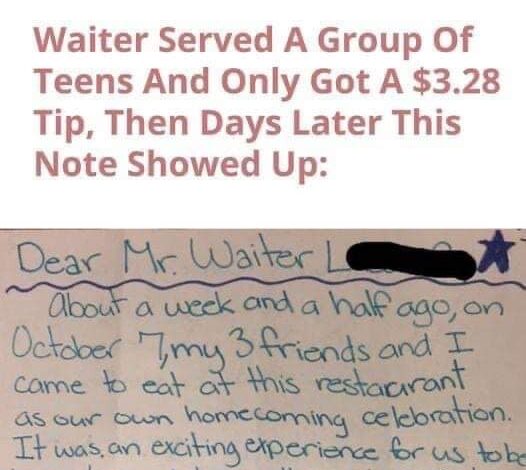
$3,28 tip irritates the waiter, When an unexpected letter arrives days later, eyes widen
A small act of kindness can sometimes carry more weight than we imagine, and one recent story has proven just how powerful a second chance can be. What began as a disappointing evening for a restaurant server in Los Angeles turned into a touching reminder that even mistakes can lead to something beautiful when people take responsibility and act with sincerity.
The server, who has worked in the industry for years, had shared their story on social media, never expecting it would resonate so widely. That night, a group of four teenagers came in to celebrate their own version of homecoming. It was a big evening for them—dining out without parents for the first time, feeling independent, and navigating the little rituals of adulthood. The server took care of them attentively, ensuring they had a memorable night. They answered questions with patience, accommodated dietary restrictions, and made sure the kids felt treated as equals rather than children. The teens laughed, enjoyed their food, and left the restaurant all smiles.
But when the server picked up the bill, their heart sank. The tip left on the table amounted to just $3.28. For a group of four with a substantial bill, it was far from the standard gratuity. To anyone who has worked in hospitality, this kind of ending is painfully familiar: hours of effort, warmth, and service, capped off by a token of appreciation that feels like an insult. As the server explained online, there is nothing more discouraging than being thanked profusely to your face, only to be left with a tip that doesn’t even cover a cup of coffee.
For many servers, this is part of the job. People come and go. Some tip generously, others don’t. Most never return to apologize. But this story took a different turn. About a week later, an envelope arrived at the restaurant, addressed to the server. Inside was a handwritten letter and some cash. The letter was from one of the teenagers, and it carried a level of honesty and humility that few would expect from someone so young.
The teenager began by explaining that the night at the restaurant had been special for them and their friends. It was their first time going out without adults, and the experience had felt exciting and grown-up. They praised the server for treating them with respect, for adjusting meals to meet dietary needs, and for making the evening fun and comfortable. Then came the apology. The writer admitted that, in the rush of paying and splitting the bill, they had completely forgotten about tipping etiquette. They confessed that they were clueless about how much to leave, and after pooling their change, the group had walked out leaving a paltry $3.28, not realizing how inadequate it was.
The teen went on to say that afterwards, guilt set in. They realized how unfair they had been to the person who worked hard to give them a good experience. Determined to make things right, they put together the “appropriate 18% gratuity plus more” and mailed it along with the heartfelt letter. “We had to put things right,” the teen wrote. “Thank you for being wonderful.”
For the server, this was nothing short of extraordinary. In their follow-up post, they admitted they had never seen such an act in all their years of serving. Mistakes in tipping happen all the time, but almost no one takes the time—or has the courage—to acknowledge them afterwards. The handwritten letter, the money enclosed, and the thoughtful words restored the server’s faith in the kindness of strangers. “People don’t always go above and beyond to make amends,” they wrote. “But when they do, it makes a world of difference.”
This story quickly resonated with thousands online, not just because of the practical issue of tipping, but because it touched on something deeper: the willingness to learn from mistakes and the power of humility. For the teens, the evening could have been just another night out. But instead, they turned it into a lasting lesson about responsibility, empathy, and respect for others’ work.
It also sparked broader conversations about tipping culture. In countries like the United States, servers rely heavily on gratuities to supplement modest base pay. While many seasoned diners know the custom of leaving around 15–20%, young or inexperienced customers often don’t fully understand the weight tips carry for service staff. This incident highlights how important it is to educate new generations not just about the mechanics of tipping, but about the principle behind it—acknowledging hard work and showing appreciation in a tangible way.
Beyond etiquette, though, the teenagers’ act of making amends carried a symbolic weight. It demonstrated that kindness isn’t about being flawless, but about how we respond when we realize we’ve fallen short. Owning up to mistakes requires courage, especially for young people, and choosing to go out of one’s way to make things right takes integrity.
The story also reminds us that second chances matter. That small envelope with a few bills and a carefully written letter did more than fix a financial slight—it lifted a weary server’s spirits and spread a little more hope in a world where hospitality workers often feel overlooked and underappreciated.
At the heart of this tale is a simple truth: humanity shows its best face not in perfection, but in growth. A few teenagers made a misstep, realized it, and chose to do better. In doing so, they not only redeemed themselves but also gave us all a story worth remembering—a story of responsibility, humility, and the power of making things right.




